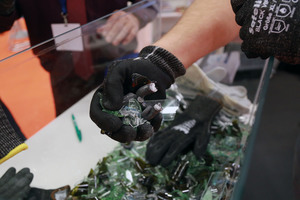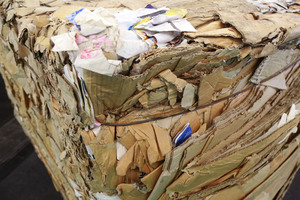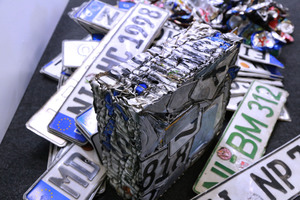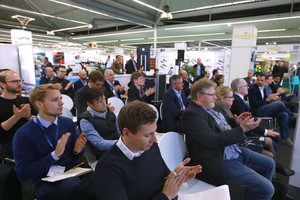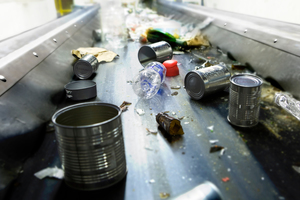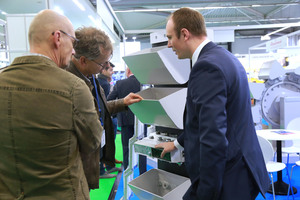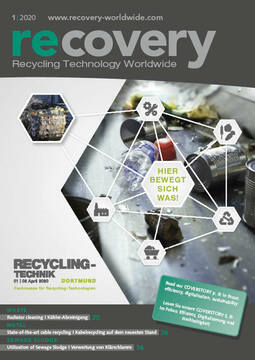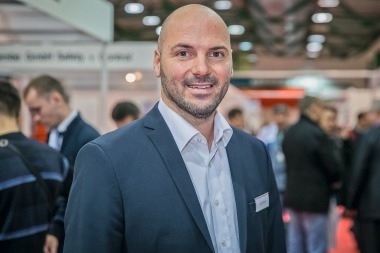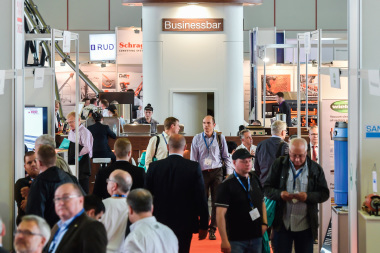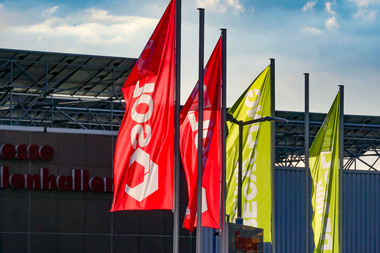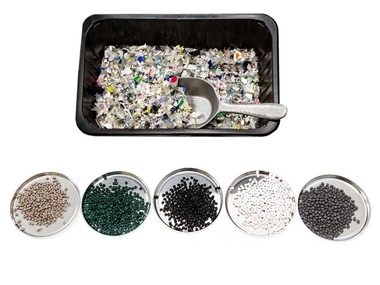SOLIDS & RECYCLING-TECHNIK 2020 fairs in Dortmund again in high-grade format
Show spotlight
The SOLIDS, in its 10th incarnation, again takes place jointly with the RECYCLING-TECHNIK. This trade show duo will be presenting a high-grade platform on all facets of bulk materials and recycling technologies in Dortmund on 1 and 2 April 2020. A total of some 500 exhibitors will be showing practically based solutions, trends and the potentials of digitalisation for achieving greater efficiency and sustainability. The exhibits on show will include baling presses, crushers, mechanical shredders, sorting systems, comminution machinery, mechanical screens and separating equipment, belt conveyors and a great deal more for recycling centres, recycling and disposal organisations, and also for companies with their own internal recycling systems.
In addition, the Munich-based organiser, Easyfairs Deutschland, will be arranging an extensive side-events programme. Up-to-date topics will be comprehensively shown at the InnovationCenter and discussed with the auditorium. Various associations will have the subjects of building-waste recycling and the circular economy as the focus of their series of papers.
Beyond this, visitors will be systematically familiarised with exhibitors and products by means of themed guided tours. Interested attendees can choose from the topics of dust-suppression, resources efficiency, „bulk-handling goes digital“, and the discharge of bulk-materials vessels.
The event will also be backed up by the 9th Urban Mining Congress, which will be taking place in the Messe Dortmund exhibition facilities within the framework of the SOLIDS & RECYCLING-TECHNIK.
Recycling and bulk-materials technologies for more sustainability
Both industry and research have long been focusing on fostering economic growth while simultaneously conserving resources. For companies, it is becoming ever more important to rethink tried-and-proven processes and make them future-viable.
Such companies are faced with the challenges of using feed materials more efficiently, introducing them more smoothly and with no losses into the process chain, minimising the generation of waste and making greater use of recycling processes. Technologies such as screening, mixing, separation and comminution are just as important for the initial processing of feed resources as for their subsequent recycling. Developments in digitalisation even now provide very useful solutions for the efficient design of procedures, as in the case, for example, of sorting processes, in which materials can be identified and separated in milliseconds. It is thus an essential obligation for the responsible managers, etc., to stay informed on the latest potentials and on trends for the future, to exchange experience, and to prepare their companies sustainably and cost-efficiently. Industrial fairs such as the SOLIDS and the RECYCLING-TECHNIK provide an ideal platform for this.
Recycling and bulk-materials technology in flux
The combination of the SOLIDS Dortmund fair with the RECYCLING-TECHNIK generates numerous synergies both for exhibitors and for visitors, especially since many bulk-materials technologies can also be found in use in the recycling industry. On a total of five lecture platforms, experts will discuss both solutions from present-day practice and trends for the future. Numerous partners of these industrial fairs will also be on hand, including the DGAW waste-management association, providing information on the implementation of the new Commercial Waste Regulations, vero e.V. on building-materials recycling, IAB (Weimar Institute of Applied Construction Research), showing building-cycle and bulk-materials simulation, and the Technische Hochschule Ostwestfalen Lippe University of Applied Sciences, on the subject of life-science technologies.
Recycling and resources efficiency in the InnovationCenter
On the podiums of the InnovationCenter, numerous experts and companies will be enriching the event with high-grade addresses on solutions, trends and innovations in the various industrial sectors.
DGAW: Implementation of the Commercial Waste Regulations: What has it achieved?
From 1.00 pm on 1 April the Deutsche Gesellschaft für Abfallwirtschaft (DGAW Waste-Management Association) will be organising,a series of papers in which the question of the implementation of the Commercial Waste Regulations will play a central role. Both legal and technical aspects are to be examined.
The organiser, the DGAW, represents more than 450 members from the most diverse range of sectors of the resources industry. There is close cooperation and reciprocal membership between all important organisations in the resources industry.
The DGAW sees itself as a platform for product responsibility and the conservation of resources. Its aim is to further develop these two future-orientated sectors by establishing a competent network for the process-chain specialists. For this purpose the DGAW provides interdisciplinary and practically based cooperation, with frank and open interchange of experience, in order to shape its environment with a knowledge lead. The various disciplines and occupational groups, the service-providers and solution-suppliers, the customer and citizen, and also the political and administrative world, have the opportunity, at their various levels, of becoming actively involved, by means of intensive interchange, in the improvement of the resources industry.
The recovery editorial team took the opportunity of posing a number of questions to DGAW board member Dr. Anno Oexle during the event within the scope of RECYCLING-TECHNIK.
recovery: Dr. Oexle, the DGAW is organising a series of papers on the subject of „Implementation of the Commercial Waste Regulations: What has it achieved?“ at the RECYCLING-TECHNIK in Dortmund on 1 April 2020. What will be the most important and stimulating points of this event?
Herr Dr. Anno Oexle: Adherence to the amended Commercial Waste Regulations has been required since August 2017, and the new technical requirements for the recycling of mixtures subject to mandatory pre-treatment, including the sorting rate (85 % by mass) and the recycling rate (30 % by mass) have applied since January 2019. By the end of March 2020, the operators of pre-treatment plants must, for the first time, inform the responsible authorities as to whether they have achieved the prescribed recycling rate. In view of these legal requirements alone, the timing of the event is well chosen for an assessment: Is the new ordinance being enforced by the responsible authorities? Has it resulted in more recycling or only in more bureaucracy? Is the recycling rate realistic? What problems arise in practice? These and other questions will be explored, with a practical emphasis, from various perspectives by various speakers.
recovery: To what target group is the event addressed? Is it intended only for DGAW members?
Dr. Anno Oexle: This event is aimed at all players affected by the Commercial Waste Regulations - that is, in particular, the generators of waste, the carriers, disposal organisations and the authorities. Which is a DGAW regional event and is open to all interested parties. This applies, by the way, to all DGAW regional events. We, as the organisers, will of course be especially pleased with visits by DGAW members.
recovery: What particular challenges do you see in the implementation of the Commercial Waste Regulations? What benefits and drawbacks will it have for waste generators, owners and disposal organisations?
Dr. Anno Oexle: The greatest challenge can, with certainty, be found in the enforcement of the new regulations. These are complex, not always consistent, and aimed primarily at waste generators. Enforcement focuses at present primarily on the disposal organisations, an approach which is entirely understandable on pragmatic criteria, in view of the large number of waste generators affected, but which is also legally questionable, since the Commercial Waste Regulations are primarily a generator-orientated instrument.
recovery: Will the new regulations cause recycling rates to increase? What needs to be changed in our recycling system in order to meet the required rates?
Dr. Anno Oexle: The operators of pre-treatment plants are required, for the first time, to report on adherence to the recycling rates by the end of March 2020. We will then know whether the legally prescribed rate can be achieved. Realistic data is important here. This applies not least of all because the federal government is obliged to determine by 31 December 2020 whether and to what extent the recycling rate needs to be adjusted – upwards or downwards – by an amendment to the Commercial Waste Regulations.
recovery: What future solutions do you perceive in order to attain higher recycling rates and come closer to the circular economy?
Dr. Anno Oexle: In my opinion, we should not focus too greatly on rates in the context of the necessary further evolution of the circular economy. The achievement of ever higher rates will only result in the desired strengthening of the circular economy provided there is also demand for the recyclates produced at considerable economic and ecological costs in the view of the quotas.
recovery: What advice would you like to give to the DGAW regional event taking place within the framework of the RECYCLING-TECHNIK? Why should people not miss this event?
Dr. Anno Oexle: I personally wish for a practically orientated and lively event which will be a genuine benefit to all attendees. Of course, there will also be the opportunity of asking questions to the speakers.
recovery: Dr. Oexle, could you please briefly explain what the DGAW is and what tasks it performs?
Dr. Anno Oexle: The aim of the DGAW is not the repüresentation of specific economic interests but, the open discussion in the interest of the circular economy and the resources industry. The DGAW is, correspondingly composed of representatives of the most diverse range of sectors in the circular economy and the resources industry – for instance, private and municipal disposal organisations, politics, science and administration. The DGAW‘s heterogeneous membership structure enables it to offer to its members an impartial interchange of knowledge and experience on the various topic areas of our industry.
„Preparation of mineral building and demolition waste and use of quality-assured recycled building materials“
vero – the Construction and Mineral Resources Association, will be focusing in its series of papers within the framework of the InnovationCenter on the fascinating and up-to-the-minute topic of recycling of building materials. This year‘s lecture event is entitled „Preparation of mineral building and demolition waste and use of quality-assured recycled building materials“, and the vero „Recycled Building Materials“ study group cordially invites all interested fair participants to attend.
„vero - the Building Materials Association“ promotes the interests of about 600 companies from all sectors of the building materials and mineral resources industry. The recycled building materials industry‘s representative body (NRW RC Building Materials Producers) is also included here, directly at NRW state level. In dialogue with decision-makers, the vero Recycled Building Materials study group advocates for impartial and practically orientated boundary conditions, moderates mediating at the interfaces between politics, industry and the public, and supports and advises its RC members on technical and legal matters, as well as on other questions relevant to the industry.
As part of a high-power network, with partners at state, federal and European level, the joint target is to conserve natural resources by means of the production and use of quality-assured recycled building materials and to further the circular economy in Germany.
In volume terms, mineral building and demolition waste make up the largest proportion of Germany‘s total annual waste yield. They are thus an important source of secondary resources, particularly in a densely populated and industry-dominated state such as North Rhine-Westphalia.
As one of the most resource-intensive sectors of the economy great importance is attached to building-materials recycling for the purpose of conserving resources and energy reserves and in view of the shrinking availability of landfill space in NRW – the building industry therefore has special responsibility to promote the use of recycled building materials in construction projects in the long term. In addition to high-quality recycling, based on controlled and selective demolition and regular monitoring of quality, the long-term intensification of multiple use in the construction sectors presupposes, above all, assured utilisation by the users in question.
recovery magazine had an opportunity of talking to Jasmin Klöckner, head of the Recycled Building Materials study group within the vero association on the lecture event.
recovery: What will be the most important and interesting items at this event?
Jasmin Klöckner: Selected specialist speakers will be examining industry-relevant and up-to-date focal topics; for instance: the use of RC building materials in public tendering procedures for construction projects, the preferential selection of mineral substitute building materials (MSB), in view of the ongoing amendment of the Circular Economy Act, and the handling and disposal of tar-containing road rubble and excavated asphalt in NRW, in order to provide information on existing and necessary boundary conditions, high-grade recycling and the correct use of RC building materials – and, equally, to discuss existing reservations and practical conceptual solutions in NRW with the attendees.
recovery: At what target group is the event aimed?
Jasmin Klöckner: This free-of-charge lecture event is open to everyone interested in the subject of building-materials recycling and is addressed, in terms of its subject focuses, to all those who are confronted with environmental, civil-engineering and resources-management questions on building-materials recycling in their companies, institutions and municipalities - in other words, producers, users, tendering bodies, approval authorities, highway engineers, the interested public, etc..
recovery: What special challenges do you perceive in the production and use of recycled building materials?
Jasmin Klöckner: Secondary resources from the processing of mineral building and demolition waste are even now being used in highway construction. If you take a look at the reuse rates for mineral building-materials recycling in Germany in recent decades, you will reach the conclusion: Everything is fine! Reuse rates of 70 to 95% have clearly illustrated this for many years. A slightly closer look will disclose that there is still a need for „correction and more detailed specification“ at some points, in order that the high-volume flows of mineral materials are put to the most high-grade and efficient uses possible, as are politically demanded, within the framework of the circular economy.
Even today, recycled construction materials are still often used as a a lower-priced substitute in subordinate earthwork and road construction work. Given the state-of-the-art in recycling technology and the certification of secondary building materials, higher-grade use of these materials would be more than merely rational, however.
An outstanding example of such a high-grade use in pure-fraction form, with reuse rates of above 90 %, is the reuse of asphalt in road bed construction. The concrete fraction of the material is also used at a high quality level as an unbound base layer.
Against this, material flows, such as mixed building and demolition waste, masonry (bricks, calcium silicate brick, aerated and lightweight concrete), gypsum, etc., are frequently used as backfill in unprocessed mixed-material form or as a residue from processing, or are used – or simply disposed of – at landfills.
On sustainability criteria - in our case, the conservation of natural resources such as gravel and crushed stone and the saving of scarce landfill capacity - the highest-grade reuse possible of quality-assured recycled building materials has been widely advocated for many years, by the public, the political world, ministries, etc.. Regrettably, this public and political stance is in many cases not echoed in practice.
Despite the fact that
quality-assured recycled building materials are required to meet precisely the same civil-engineering demand and standards as, for example, must be fulfilled by the primary building resources of gravel and crushed stone, and
all environmental-protection requirements of the relevant „Recycler Directive“ of 9 October 2001 are met and
the use of recycled building materials is generally more cost-efficient than the use of corresponding primary building materials,
there is frequently too little use / consideration of RC building materials, as is reflected, above all, in public tendering procedures for construction projects. Public invitations to tender for civil-engineering projects are frequently restricted, with no alternatives to primary building materials allowed, or are published with the express „exclusion of RC building materials“, despite the fact that RC building materials could be used.
The reasons for this can be found, inter alia, in competition from adequate supplies of primary building materials, an only moderate or low acceptance of RC building materials, due to their stigmatisation as „waste“ and, associated with this, the environmental safety which must additionally be assured and for which there has for years been a lack of any Germany-wide legally watertight legal provision. This, of course, inhibits the purchasing behaviour of project clients.
Successful waste valorisation in the long term can thus be attained only by means of high-quality recycling which will permit high-grade reuse by exploiting new recycling routes and the optimisation of recycling technologies. The incentive to raise quality, conversely, can be created only given corresponding sales markets.
Corresponding efforts must be adequately acknowledged. Here, the public sector, as the building industry‘s most important client, will play a key role. So there are still many potentials and challenges in the recycling of mineral building materials, they need only to be recognised, funded and implemented by the players in this field. The use of quality-assured RC building materials means that risks can be excluded.
recovery: What political demands has your association and what legal provisions remain necessary to increase the use of recycled building materials? What are the vero association‘s most important topics for the future?
Jasmin Klöckner: The political world is called upon, at this point, to create the necessary boundary conditions – standard throughout Germany and practically orientated – which will assure more legal certainty for both the producers and users of RC building materials.
Potentials for this are offered by the so-called Substitute Building Materials Ordinance (EBV), which has been in preparation for ten years within the scope of the Umbrella Ordinance (MantelV). This should define the uniform regulations lacking up to now in the federal states on the environmentally safe use of RC building materials for the whole of Germany and thus create legal certainty throughout the country. In addition, the introduction of the „non-waste classification status“ for the best RC quality grades can, given binding quality monitoring, make a positive contribution to the recycling of building materials. It will therefore be a necessary approach to making high-grade quality-assured recycled building materials more competitive in principle vis-à-vis primary mineral resources. An important consideration in this context is that all the players in the contentious field of „Circular economy – Protection of groundwater – Protection of the soil“ should find a viable, legally reliable and practicable solution which will actually eliminate existing hindrances and not cause new barriers and negative diversions of flows of materials.
The legislative process has not yet been completed, because there are differing views in detail on the part of the federal government, the states and industry. vero will therefore continue to actively monitor and contribute to the legislative process.
RECYCLING-TECHNIK Dortmund 2020, 1 & 2 April 2020, Messe Dortmund
6th Specialist Fair for Recycling Technologies
Both German and international exhibitors will be presenting their technologies and solutions for the recycling and environmentally safe disposal of waste products. Our specialist visitors are made up of top-level decision-makers and purchasers with specific needs from the following industries: Demolition and building-materials recycling, Waste and by-products, Biomass, Glass, Wood, Plastics, Materials handling, Paper, Scrap, Metals.
The 10th SOLIDS Dortmund – Industrial Fair for Granulate, Powder and Bulk Materials Technologies will be taking place in parallel.
Products and technologies for the collection, sorting, transportation and preparation of recyclable materials and for environmentally safe disposal
Cross-sectional, control and instrumentation technologies, and occupational safety and waste-to-energy solutions
Trading in secondary materials
Fire and explosion safety in recycling plants
Other services
Demolition waste and building materials recycling
Waste and by-products
Biomass
Glass
Wood
Plastics
Materials handling
Paper
Scrap and metals
Implementation of the Commercial Waste Regulations: What has it achieved?
DGAW regional event; Wednesday,
1 April 2020, 13:30 – 15:30 h;
Messe Dortmund, Rheinlanddamm 200, 44139 Dortmund, Hall 7, InnovationCenter I
Free-of-charge registration for the fair, using Code 2600, at www.recycling-technik.com/en/
Wednesday, 1 April 2020, 13:00 h
Dr. Anno Oexle, Köhler & Klett Partnerschaft von Rechtsanwälten mbB, Attorneys
Dr. Anno Oexle, Köhler & Klett Partnerschaft von Rechtsanwälten mbB, Attorneys
N. N.
Katharina Reh, Fraunhofer UMSICHT
Representative of the industry requested
Sylvia Zimack, Meinhardt Städtereinigung GmbH & Co. KG
Preparation of mineral building and demolition waste and use of quality-assured recycled building materials“
Free-of-charge registration for the fair, using Code 2600, at www.recycling-technik.com/en/
Wednesday, 1 April 2020, 12:30 h – 15:15 h, Bergen Room, North entrance to exhibition grounds, in cooperation with: vero – Construction and Mineral Resources Association
Jasmin Klöckner, CEO of BRB and vero RC building materials study group
Jasmin Klöckner
Berthold Heuser,
Chairman of the vero Recycled Building Materials study group, Duisburg /
REMEX Mineralstoff GmbH, Düsseldorf
Attorney Dr. Henning Blatt,
KOPP-ASSENMACHER & NUSSER firm of attorneys, Düsseldorf
Dr.-Ing. Klaus Mesters,
KM GmbH Prüfinstitut für Strassenbau und Umwelttechnik, Bochum
The new NRW State Environmental Agency guide „Tar-containing road construction waste and excavated asphalt: Recognition, handling, disposal“
Dipl.-Biol. Claudia Lodwig,
State Environmental Agency NRW, Recklinghausen
Evaluation from a practical viewpoint
Dr.-Ing. Klaus Mesters,
KM GmbH Prüfinstitut für Strassenbau und Umwelttechnik, Bochum

